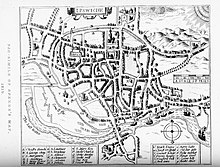John Speed's Ipswich

John Speed's Ipswich is a graphic account of the town of Ipswich, Suffolk created by John Speed in conjunction with the Dutch engraver, Jodocus Hondius, in 1610.[1] It was featured as an inset for his map of the county of Suffolk, published in Theatre of The Empire of Great Britaine. It is the earliest extant map of Ipswich and features many buildings of the late medieval period, whilst at the same time showing streets laid out in a grid pattern which has largely been retained into the twenty first century.[2]
Elments of John Speed's Ipswich[edit]
John Speed's map contains different key elements:
"Orwell flu."[edit]
The river labelled "Orwell flu." has been known as the River Gipping or Little Gipping.
Parish churches[edit]
Ipswich was divided into four wards, each further subdivided into parishes centred on a parish church, as follows.[2]
| Ward | |||
|---|---|---|---|
| East | St Clement's (K) | St Mary at the Quay (N) | St Stephen's (H) |
| West | St Matthew's (D) | St Mary-le-Tower (E) | St Mary at the Elms (F) |
| North | St Margaret's (C) | St Helen's (I) | St Lawrence's (G) |
| South | St Peter's (M) | St Nicholas' (L) |
Each ward had a headborough who was the leet officer for the ward.
Other religious buildings[edit]
Town gates[edit]
Other buildings[edit]
- Poorhouses (mislabbelled Y, actually Z): These are the Tooley's and Smart's Almshouses. These had been founded in 1550 by Henry Tooley with a further endowment provided by William Smarte (MP) in 1591.[3] They were rebuilt as a whole in 1846.[3]
References[edit]
- ^ van Loon, Borin. "Ipswich Historic Lettering: map 1610". www.ipswich-lettering.co.uk. Borin van Loon. Retrieved 6 September 2020.
- ^ a b Amor, Nicholas R. Late Medieval Ipswich : Trade and Industry. Woodbridge, Suffolk: Boydell Press. ISBN 9781843836735.
- ^ a b "Tooley Court Tooley's and Smart's Almshouses". historicengland.org.uk. Historic England. Retrieved 7 September 2020.

